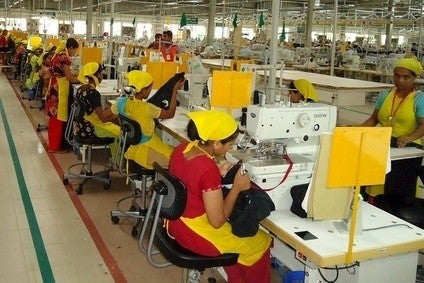
Unions and worker rights groups have warned the future of the Accord continues to hang in the balance after the Bangladesh government was granted a further delay on a decision regarding the agreement’s future.
The groups are also urging Bangladesh’s trading partners and global apparel brands to press the country’s government to refrain from imposing what they call “shocking impediments” to the Accord continuing its work.
It is the third time the Supreme Court of Bangladesh has adjourned a hearing on a petition filed by the Accord challenging a High Court directive asking it to end all activities in Bangladesh on 30 November.
The hearing was initially set to take place on 6 December, but was pushed back to 10 December – and is now set to take place on 17 December. Local reports say the decision came after the advocate on record, Sufia Khatun, asked for more time as the lawyer for the Accord was taken ill and could not place an argument before the court.
However, unions and worker rights groups say the government has been given further time to consider the Accord’s response to constraints the government wants to impose on its operations. This includes subjecting all Accord decisions to the approval of a government committee. Another condition would prohibit Accord inspectors from identifying any new safety violations, “effectively requiring them to ignore deadly hazards found during their inspections, such as faulty alarm systems, blocked fire exits, and cracks in structural columns.” Yet another would prevent the Accord from taking any action against factory owners who threaten or fire workers for raising safety complaints.
The groups, including the IndustriAll Global Union, the Clean Clothes Campaign, the Worker Rights Consortium and the Maquila Solidarity Network, say the “highly obstructive constraints strip the globally-respected safety initiative of its ability to operate independently of government and employer control.”

US Tariffs are shifting - will you react or anticipate?
Don’t let policy changes catch you off guard. Stay proactive with real-time data and expert analysis.
By GlobalDataThe government wants its Remediation Coordination Cell (RCC) to oversee workplace safety and remediation once the Transition Accord ends – but international stakeholders fear the RCC is not yet prepared to take on the responsibilities of the Accord’s inspection programme, despite the government’s claims to the contrary.
“All evidence points to a lack of readiness, including a recent report by the Bangladesh Sustainability Compact – a cooperation agreement between Bangladesh, the European Union, the United States, Canada, Bangladesh and the International Labour Organization – which shows that the national inspectorate fails to act transparently and has only one third the amount of inspectors to monitor twice as many factories as are currently covered by the Accord,” says the Clean Clothes Campaign.
“The Bangladesh Department of Inspection for Factories and Establishments, which carries out inspections for the RCC, reports a woefully low 29% completion rate for mandatory safety renovations at factories the government is ostensibly regulating,” it continues. “The average progress at Accord-covered factories is 90%. Until the government of Bangladesh demonstrates the capacity and political will to regulate the industry, the Accord is essential to protect the safety of workers.”
Because the Accord is a binding agreement between unions and apparel brands, it will remain in effect through 2021, CCC says, with all brands remaining bound to their obligations under the agreement, including the obligation to cease business with any factory that refuses to operate safely.
However, without a local office, CCC says the Accord would have to use international engineering firms to carry out inspections, and the Accord’s ability to monitor and verify remediation progress would be “severely curtailed, with grave consequences to workers’ safety and the progress achieved over the past five years.”
According to the global signatories, since the Accord came into effect in 2013 it has identified more than 100,000 fire, building, and electrical hazards and the large majority have been rectified. Over 2m workers have participated in safety training in over 1,000 factories.
Despite this, over 50% of the factories still lack adequate fire alarm and detection systems and 40% are still completing structural renovations, they say.
“Unless the BGMEA and the Bangladesh government swiftly negotiate with the Accord a feasible way for its full operations to continue, the future prospects for favourable tariff treatment for Bangladeshi exports will be much dimmer.”
just-style reached out to the BGMEA (Bangladesh Garment Manufacturers and Exporters Association) for comment but did not receive a response at the time of going to press.



